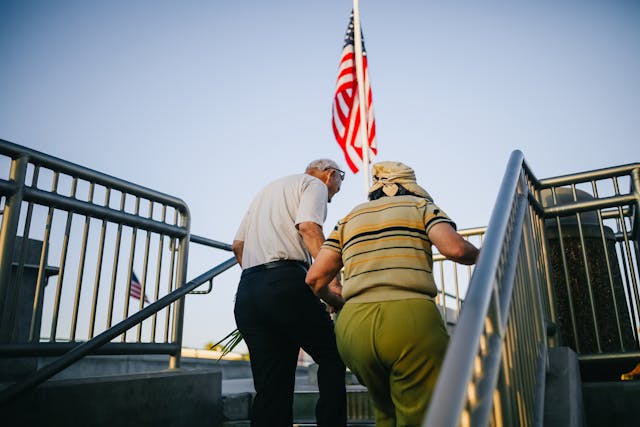
Why does walking become harder as we get older? It is a combination of age-related factors, such as stiff joints, brittle bones, lack of balance, deteriorating muscles, shortening ligaments, deteriorating nerves, and even neurological factors.
As we age, our bodies start to deteriorate and that results in a changed way of walking. That is unavoidable, but it is possible to push it back by exercising more and doing balance training. However, even people who exercise throughout their lives will find it hard to walk at some point. That could be 60 if you don’t exercise and possibly 100 if you do. Clint Eastwood is a good example. He has just turned 94 and he is still directing and sometimes acting. He is obviously much frailer than he used to be, but he can play golf, walk far, and direct movies, which must be tiring. He has spent his whole life exercising, and trying to eat healthily, not overeating, avoiding excess carbs and not eating ultra processed food.
So, what happens to our bodies as we age that makes it so hard to walk? The gait of elderly people is obviously different to younger people. The first thing that causes this is stiff joints. We have different kinds of joints, but they all work by having a capsule that contains a lubricating fluid and cartilage that cushions the joint. As we get older, we slowly start to lose cartilage. Once that is too thin, the bones are almost contacting each other. The amount of lubricating fluid decreases as well. The cartilage decreases because the cells that it is made of last for a very long time. Skin cells renew themselves very often, but cartilage doesn’t and that means it is very easy for cell damage to appear and not be fixed. It is possible to have a joint replacement, but without it, stiff joints makes it very hard to walk properly. The joint stiffness is compounded by the ligaments shortening and stiffening as well. A lot of joints are kept stable by ligaments and when these shrink and get stiff, the joint loses a lot of its range of motion. One of the biggest places where this can have an effect on walking is the spine. As the fluid and cartilage disappears, it gets harder to move the spine properly, which affects posture and movement.
Second, brittle bones can affect how people walk as well. As we age, our bones lose calcium and other minerals, That results in a loss of bone density, which makes them more brittle and fragile. Brittle bones don’t necessarily affect how someone walks, but it can have a big psychological impact. Knowing that a fall will result in more damage than when a person was younger, possibly even broken bones, can lead them to walk more hesitantly.
The third thing is a lack of balance. This can be caused by deterioration of the inner ears, or it could be caused by a deterioration of the senses, such as sight. As people age, their ability to sense the environment slows down, and this can have an effect on balance. They also receive reduced balance feedback signals from their bodies because of the poor joints they have. As people age, they may also be on a lot of medication, which can contribute to balance problems. Once someone has balance issues, they will probably change the way they walk to compensate, or possibly even stop walking.
The fourth thing is deterioration of muscles. As we age, our bodies deposit something called lipofuscin in our muscles, liver, kidneys, heart, eyes, nerves, and neurons. Lipofuscin is created when unsaturated fatty acids are oxidized and their accumulation causes a lot of age related deterioration. When we are younger, it is cleared out, but it builds up as we age. We lose muscle mass as we age, but lipofuscin makes it worse. We lose muscle fiber and our muscles don’t regenerate as quickly. The speed at which we can flex and relax the muscles declines. Having muscles that don’t move as easily makes the walking gait much more wooden and unbalanced. This reduces a lot of fine motor control and may make any balance problems worse. A lot of these things compound with each other. The lack of muscle reduces reflexes as well, which makes it harder for people to react when they are walking or correct a fall before it is too late.
The fifth thing is the nervous system. The nerves in the body start to atrophy, which means that they don’t send as many signals or send them as easily. The brain no longer gets all of the stimuli that it did when the person was younger, which makes the whole system just a little bit harder to manage.
The sixth thing is neurological. As people age, there is more change that they will suffer from neurological problems, such as dementia or Parkinson’s disease. These will also affect balance and worsen all of the other age-related factors.
The main problem with walking difficulties that appear as someone ages is that once it becomes difficult to walk, people refrain from walking, which just compounds the problems. It is a spiral. The only way to be able to walk, is to walk, which is hard to do. Exercising is a huge benefit and we should all get into the habit of exercising when we are young and keep it up for as long as we can. And this is what I learned today.
Photo by RDNE Stock project: https://www.pexels.com/photo/elderly-people-slowly-going-up-the-stairs-5637856/
Sources
https://medlineplus.gov/ency/article/004023.htm
https://medlineplus.gov/ency/article/004015.htm
https://en.wikipedia.org/wiki/Lipofuscin
https://www.onepeloton.com/blog/stretch-before-running
https://www.betterhealth.vic.gov.au/health/conditionsandtreatments/ageing-muscles-bones-and-joints
https://www.nia.nih.gov/health/falls-and-falls-prevention/older-adults-and-balance-problems
https://theconversation.com/explainer-why-does-our-balance-get-worse-as-we-grow-older-48197

Pingback: What is a hernia?